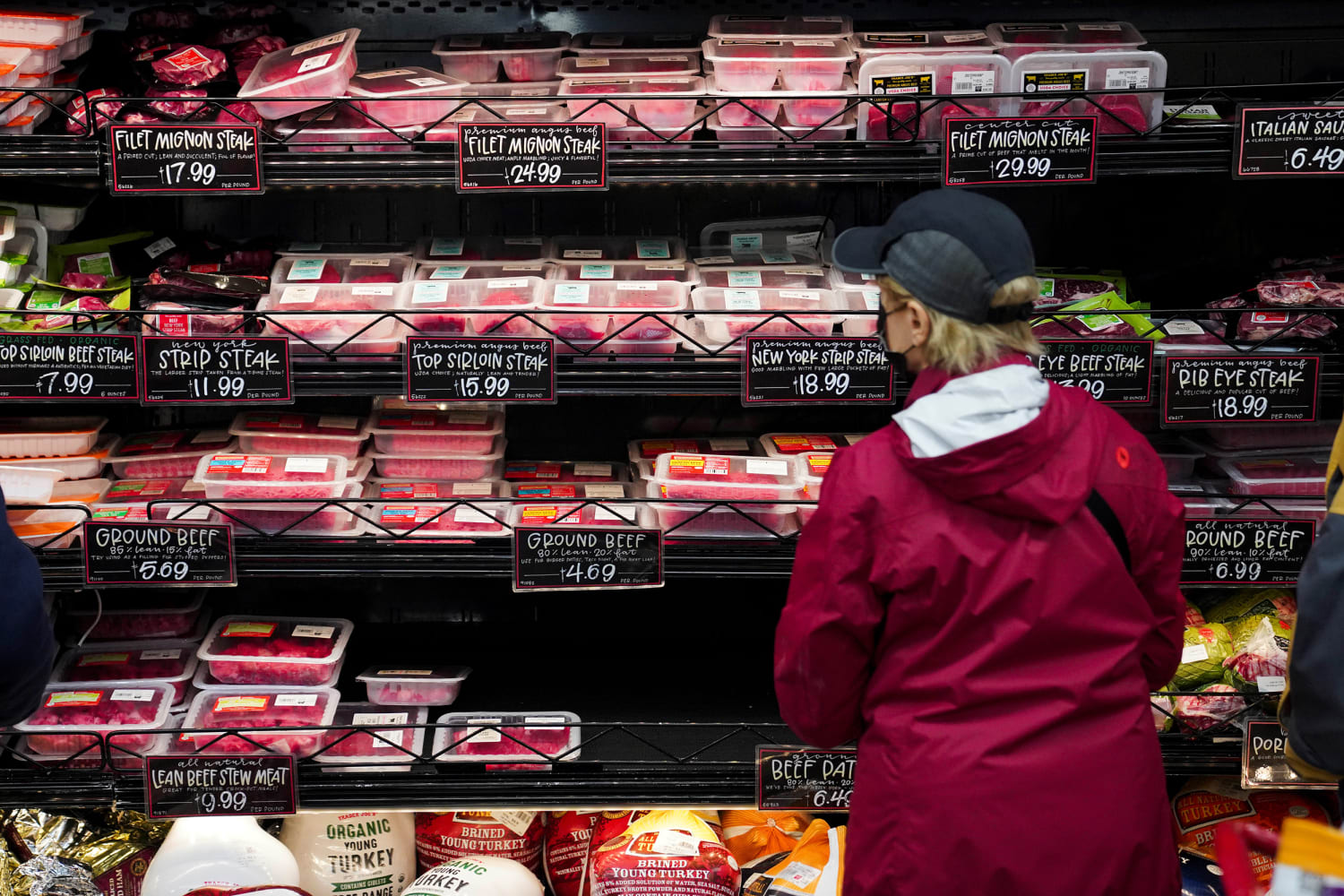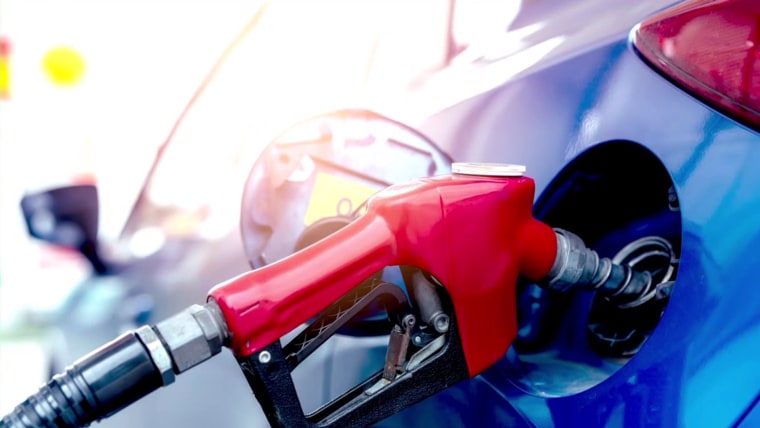WASHINGTON — Republicans have seized on inflation as a centerpiece of their campaign to take back Congress next fall, laying blame for rising prices on President Joe Biden and his congressional allies as voters express increased concern.
“This is going to be devastating for them,” said Sen. Rick Scott, R-Fla., the head of the GOP’s Senate campaign arm, which is running ads during the Thanksgiving holiday highlighting higher gas and food prices.
In an earlier interview with The Wall Street Journal, he called the issue “a gold mine” for Republicans.
But beyond blocking Biden’s wide-ranging social safety net and climate action plan — under consideration in the Senate through a process that would allow Democrats to pass it along party lines — how the GOP would tackle a notoriously difficult economic trend is less clear.
Interviews with a half-dozen Republicans showed that while the party is not yet unified around a specific plan, other proposals include boosting domestic energy production, eliminating Covid-19 restrictions and vaccine mandates and cutting shipping and trucking regulations.
Experts said the Republican ideas amount to a mixed bag: Some could help alleviate inflationary pressures, while others would have little effect or no effect in addressing the cause of increased costs or would not materially affect the economy for years.
“Our first plan to deal with inflation: We do everything we can to discourage passing this second bill,” Sen. Roy Blunt, R-Mo., said, referring to the social safety net legislation. Biden signed the first phase of his agenda, a package to fund improvements to the nation’s physical infrastructure that garnered bipartisan support, earlier this month.
Asked what affirmative steps should be taken, Blunt responded: “The most affirmative policy step is to not pass a bill that raises energy prices and puts a lot more money into the economy.”
But economists say that unless government spending is slashed across the board, blocking this particular piece of legislation, even with its $1.68 trillion price tag, won’t do much to address the issue.Inflation in the U.S. is partially influenced by the global supply chain crisis, shifting consumer behavior and an influx of government spending approved by Biden and then-President Donald Trump to keep households afloat during the pandemic.
Of the roughly $5 trillion in stimulus injected into the economy since the start of the pandemic in early 2020, more than half came under Trump with overwhelming Republican support, particularly in the Senate.
John Cochrane, a free-market economist at the Hoover Institution, said he sees the injection of money into the economy over the past two years as the leading cause of inflation. Limiting spending of all kinds would slow the trend, he said.
“The primary cause of inflation is the massive fiscal transfer of the last year, more on its way, and the Fed with foot still on the gas,” he said in an email, referring to the Federal Reserve’s policies around the purchasing of Treasury securities and bonds.
Austan Goolsbee, an economics professor at the University of Chicago who chaired the Council of Economic Advisers under former President Barack Obama, said Republican arguments that passing Biden’s social safety net legislation would have an outsize impact on inflation trends amount to a “a red herring,” noting the total cost is spread over a decade and any impact over the next year-plus would be “very modest.”
Still, the White House appears to recognize Democrats’ political vulnerability, though there are positive economic indicators like job and wage growth and strong stock market performance.
October’s Consumer Price Index recorded a 6.2 percent year-over-year increase — the largest jump in three decades and a jolt that exceeded economists’ expectations. A recent survey from Navigator Research, a Democratic-aligned polling shop, found that 92 percent of voters are concerned inflation will climb in the coming months. And an October NBC News poll found that Republicans hold a 24-point edge over Democrats on which party better handles inflation.
Biden recently called reversing inflation trends a “top priority,” and Democrats have sought to rebrand his Build Back Better Act as an antidote to pocketbook pressures for middle-class families on child care and prescription drug costs.
On Tuesday, Biden announced the U.S. will tap the Strategic Petroleum Reserve to try to ease rising gas prices ahead of the Thanksgiving holiday, a move that came a day after Biden announced the renomination of Federal Reserve Chairman Jerome Powell, a Republican first tapped by Trump, to a second term overseeing U.S. monetary policy.
“After Sen. Rick Scott’s disgusting admission that Republicans see inflation as a political ‘gold mine’ and are actively hoping that it gets worse and hurts more families, Republicans are now proposing an agenda that would do exactly that while fueling the pandemic and selling out the middle class to the ultra-wealthy,” White House spokesman Andrew Bates said of the Republican proposals to combat inflation.
When pressed, several Republicans said their plan to keep inflation down is to encourage more fossil fuel production through a variety of means, including loosening policies around drilling and pipeline development.
Some criticized the Biden administration for high-profile moves such as revoking the permit for the Keystone XL pipeline, the crude oil pipeline proposal that Native American and environmental groups have fought for years.
“Well, one thing you don’t do is you don’t come into office and eliminate the Keystone pipeline,” Sen. John Boozman, R-Ark., said in an interview, referring to the fact that Biden signed the executive order revoking the permit on the same day he was sworn in. “You don’t eliminate drilling on public lands. All of that is raising the price of fuel, which is such an undercurrent of inflation.”
Despite Biden signing a separate order early in his administration halting oil and gas leasing on federal lands, his administration was on pace to approve more permits this year for such drilling than at any time since former President George W. Bush was in office, The Associated Press reported this summer. On Friday, the Biden administration proposed reforms that would raise costs for energy companies seeking to drill for oil and gas on public lands.
Mark Bednar, a spokesman for House Minority Leader Kevin McCarthy, R-Calif., said other ideas include adding work requirements to the child tax credit and earned income tax credit, both of which were expanded during the pandemic. Those expansions would be extended under Biden’s Build Back Better plan. Bednar also said the party would prevent unemployment insurance from again reaching the level it was expanded to during the pandemic.
Those expanded benefits — first a $600 boost to unemployment checks approved under Trump and later a $300 enhancement — have expired. The unemployment rate has dropped from 14.8 percent in April 2020 to 4.6 percent last month.
Separately, Rep. Jim Banks, R-Ind., chair of the Republican Study Committee, called for loosening shipping and trucking regulations and ending vaccine mandates and any remaining Covid restrictions.
While he agrees with reforming unemployment insurance and encouraging domestic energy production, Cochrane doesn’t see either as a way to quickly curtail inflation. As for ending Covid restrictions and vaccine mandates, Cochrane doesn’t see a direct link to inflation.
Goolsbee called loosening shipping and trucking regulations “reasonable and interesting” but said many of the other ideas around domestic energy, Covid restrictions and unemployment insurance are political talking points as opposed to anti-inflationary solutions.
“I can’t believe they’re still talking about unemployment insurance, like they’ve got to be kidding,” Goolsbee said, adding the elimination of expanded benefits had little impact on growing the labor force.
As for how he would curb inflation, Goolsbee proposed items Republicans are unlikely to bring up on the campaign trail — such as eliminating Trump-era tariffs to cut costs on imports and boosting immigration to alleviate labor market pressures, as well as curtailing further spread of Covid to get consumers spending more on services and less on goods.
“If people would go back to spending money on restaurants, Disneyland, vacations,” he said, “I think that would relieve inflationary pressure quite a lot.”
Allan Smith reported from New York, and Sahil Kapur from Washington, D.C.
Source: | This article originally belongs to Nbcnews.com










